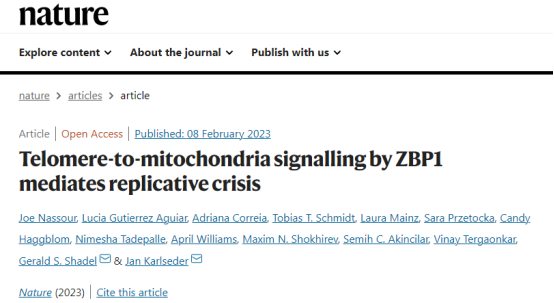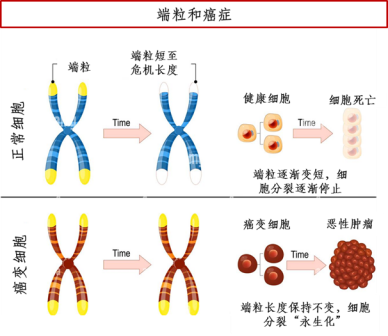科学文献
The mysterious power that guards the life clock seems to be the embodiment of mankind's eternal pursuit of health and longevity. In the field of medicine, especially in the fight against cancer, a life-threatening disease, scientists have been working hard to find and reveal the secrets that can enhance the body's own ability to fight cancer.
As technology advances, we have been able to gain a deeper understanding of the mysteries of life and how cancer destroys our bodies at the cellular level. In the process, scientists have discovered that by adjusting lifestyle, optimizing dietary habits, increasing exercise, and even using certain drugs and therapies, we can effectively enhance the body's ability to fight cancer.
On the stage of life, everyone desires health and longevity. However, cancer, a "life killer", is always threatening our health. In recent years, scientists have discovered a magical substance - telomere, which is closely related to anti-cancer.
The shortening of telomere length increases the genetic instability of cells, making it easy for abnormalities such as gene mutations to occur, increasing the risk of tumors. Once tumor cells are generated, the action of telomerase causes the telomeres to be "abnormally" stabilized at a certain length, achieving immortality . To maintain the balance of the body, telomeres need to find a balance between natural shortening and maintaining stability to prevent the formation of cancer. So, how do telomeres control this balance point ?
In 2019, Jan Karlseder's research team at the Salk Institute for Biological Studies in California, USA, discovered that cells with telomeres at crisis length are cleared through the process of autophagy , in which the body removes damaged cells by itself. This beneficial natural process removes cells with very short telomeres and unstable genomes, and is a powerful barrier to prevent cancer formation . However, it remains unknown how the autophagy-dependent cell death program is activated during the crisis of extremely short telomeres.
In 2023, Jan Karlseder's team, who studies telomere biology and how telomeres prevent cancer formation, teamed up with Gerald Shadel's team, who studies the role of mitochondria in human disease, aging, and the immune system, to explore the above questions. Using human skin fibroblasts for genetic screening, they discovered interdependent immune sensing and inflammatory signaling pathways (similar to the pathways that the immune system uses to fight viruses) that are essential for cell death during crises . Specifically, they found that RNA molecules from short telomeres activated immune sensors called ZBP1 and MAVS on the outer surface of mitochondria in a unique way.

Figure 2 Research results (Source: [5])
When telomeres become critically short, they communicate with the cell’s “power plants” — the mitochondria. This communication triggers a complex set of signaling pathways and provokes an inflammatory response that destroys cells that are likely to become cancerous . These findings demonstrate an important connection between telomeres, mitochondria, and inflammation, and highlight how cells can bypass the critical length barrier and become cancerous when pathways do not function properly. This could lead to new ways to prevent and treat cancer, as well as to design better interventions to counteract the harmful consequences of aging [5]. "Telomeres, mitochondria and inflammation are three hallmarks of aging that have most often been studied separately," said Shadel. "Our results reveal a telomere-mediated tumor suppression mechanism, showing that stressed telomeres send RNA messages to mitochondria to cause inflammation . This highlights the need to study the interplay between these hallmarks to fully understand aging and potentially intervene to extend human healthy lifespan. " " Cancer development is not a simple process, but rather a multi-step process that requires many alterations and changes throughout the cell. A better understanding of the complex pathways connecting telomeres and mitochondria may facilitate the development of novel cancer therapies in the future, " said Joe Nassour, a senior researcher in Jan Karlseder's group. " There is a synergy between extremely short telomeres, mitochondria and innate immunity that has evolved to protect against age-related cancers in humans . Next, the scientists plan to further investigate the molecular basis of these pathways and explore the therapeutic potential of targeting these pathways to prevent or treat cancer.

Telomeres are structures at the ends of chromosomes. They are like " timers " in our lives , determining the life span of cells. When telomeres shorten to a certain extent, cells will stop dividing, thus causing aging and disease. However, scientists have discovered that by protecting the length of telomeres, cell aging can be delayed and even the occurrence of cancer can be inhibited.
Telomere length is affected by many factors, including lifestyle, eating habits, environmental factors, etc. Maintaining a healthy lifestyle, such as regular work and rest, balanced diet, moderate exercise, etc., can help protect the length of telomeres, thereby delaying cell aging and reducing the risk of cancer.
In the face of various challenges and difficulties in life, we must learn to respond positively. Maintain an optimistic attitude, believe in our own strength, and bravely pursue our dreams. Such an attitude towards life will help us maintain physical and mental health, thereby better protecting the length of our telomeres.
Take care of yourself, pay attention to your physical health, have regular physical examinations, and promptly detect and treat potential diseases. At the same time, you should also care for others, help others, and pass on love. Such a lifestyle helps us build harmonious interpersonal relationships, reduce psychological pressure, and thus is conducive to the protection of telomeres.
In the busy work and life, we must learn to balance work and rest. Arrange time reasonably, ensure adequate sleep and rest, and let the body be fully repaired and restored. Such a rhythm of life helps us maintain physical and mental health and delay cell aging.
The research on telomere anti-cancer reveals the secret of life and reminds us to cherish life and face life positively. By maintaining a healthy lifestyle, caring for ourselves and others, and balancing work and rest, we can better protect the length of telomeres, delay cell aging, and reduce the risk of cancer. Let us work together and welcome every beautiful tomorrow with a positive attitude towards life!
Aunt Li is a cancer patient who fell into despair after learning that she was ill. However, with the encouragement of her doctor and family, she decided to face life positively and adjust her lifestyle. She began to pay attention to healthy eating, exercise every day, and maintain an optimistic attitude. After a period of hard work, her physical condition gradually improved and the cancer cells were under control. The doctor told her that this was because she actively protected the length of her telomeres, delayed cell aging, and thus improved her ability to fight cancer.
This story tells us that protecting the length of telomeres is crucial to fighting cancer. We should cherish our bodies and actively adjust our lifestyles to allow telomeres to play a greater role in our lives.
